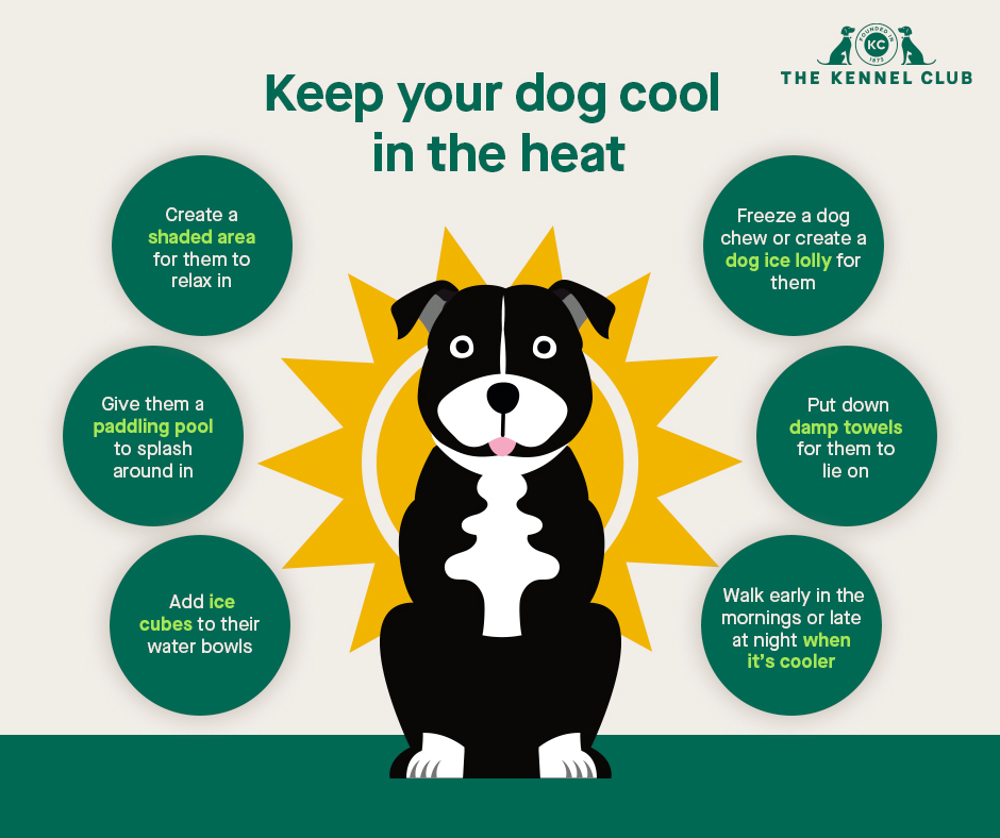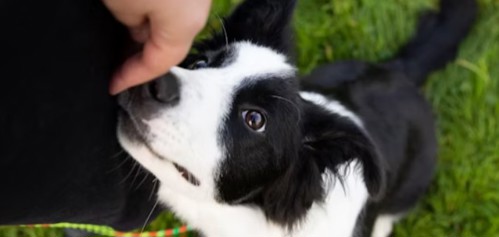
Whether you’re in your garden, inside your house or going for a summer walk it’s important to keep your dog cool during heatwaves and hot or humid weather. Keeping your dog cool can not only help them feel more comfortable, but it can also reduce their risk of heatstroke.
Why is it important to keep your dog cool in summer?
Dogs can sometimes find it difficult to cope with hot weather and are more at risk of heatstroke than we are. Heatstroke can be very serious and as a dog’s internal temperature rises it can cause damage and lead to organ failure. Heatstroke can quickly kill and 1 in 7 dogs that are taken to the vets with heatstroke die.
Which dogs are more at risk?
All dogs can develop heatstroke, but some dogs may be more at risk than others. Research has found that dogs with a higher chance of developing heatstroke include those that are:
- Overweight
- Flat-faced
- More energetic
- Older
- Bigger, particularly those over 50kg
- Have longer or thicker fur
- Have health issues, including being dehydrated or having heart or breathing problems
The best lifetime dog insurance
Protect your dog with the UK's Number 1 pet insurer, with up to £25,000 cover for vet fees.
Keeping your dog cool during walks on hot days
Exercise is the most common cause of heatstroke, so on hot days always remember to:
- Walk your dog in the early morning or evening and avoid the midday sun
- Always carry water and something for your dog to drink from
- Consider attaching a lead to a walking harness rather than to their collar. Leads that pull on a collar can press on their airways and stop them from cooling down as effectively. Remember that it’s a legal requirement for a dog to wear a collar with their owner’s name and address on when out in public
- Take care when exercising any unwell or dehydrated dogs on hot or warm days, as they may find it more difficult to control their body temperature
- Know the signs of heatstroke and watch out for them
- Remember that pavements on hot days can burn your dog’s footpads, so try to avoid them. If it’s too painful for you to place the back of your hand on a pavement for seven seconds then it’s too painful for your dog to walk on
Keeping your dog cool in the garden
Spending time in your garden on a hot day can help to cool you and your dog down, but remember to:
- Ensure there’s a water bowl for your dog to drink from, ideally both inside and outside the house. Put the water bowl in the shade to keep it as cool as possible
- Ensure your dog has a shaded space to keep them out of the sun
- Give your dog a paddling pool to splash around in
- Play with your dog with the hose and let them enjoy getting wet
- Keep your dog out of hot greenhouses. Even if the door is left open, these buildings tend to be incredibly warm
- Try giving your dog one of our homemade, frozen treats to help keep them cool
Keeping your dog cool in the car and on long journeys
Even on warm days a car can act as a greenhouse, with temperatures inside the car being much higher than outside. Always remember to:
- Never leave your dog in the car by themselves
- Make sure your dog has a safe, comfortable and cool spot in the car when you’re driving
- Make regular stops to check on your dog and ensure that they have access to water
- Travel with cool water in a thermos to give to your dog
- Avoid travelling during the hottest times of the day
- Drive with the windows open or the air conditioning on
- Use window sunshades to help reflect the sun’s rays and keep the car cooler when travelling
- If using public transport, try not to travel on hot days or, if possible, check that the public transport you intend to use is air conditioned
- Check that all places you want to visit are dog friendly so that you can take your dog in with you
Keeping your dog cool in the house?
During warm summer days it’s easy for your house to warm up. Some dogs may be able to cope with this rise in temperature, while others may struggle. On hot days remember to:
- Ensure your dog always has access to drinking water
- Add ice cubes to your dog’s water bowls
- Freeze a dog toy and let them chew on it
- Put down damp towels for your dog to lie on
- If your dog has a long or heavy coat you could keep them clipped to make them feel more comfortable
- Keep dogs out of hot conservatories
- Avoid housing your dog in direct sunlight
keeping your dog cool at the beach
When visiting the beach with your dog on hot days remember to:
- Go to the beach when its cooler, such as in the early morning or early evening, and avoid the midday sun
- Take a sun tent or a beach umbrella to ensure that there’s always an area of shade for your dog to get out of the hot sun
- Take plenty of fresh water with you. If possible, take ice cubes in a cool bag to drop into their water, or store cold water in a thermos to keep it cool
- Ensure your dog has plenty of water breaks to keep them hydrated
- Don’t exercise your dog too much. Over exercising on hot days is the main cause of heatstroke in dogs
- Let them splash in the sea to cool down. Remember to read our water safety tips before you go to the beach
Keeping your dog cool at night?
Most dogs are unlikely to develop heatstroke during the night, but on very hot muggy evenings your dog can feel just as uncomfortable as you, so why not try:
- Letting your dog sleep in an air conditioned room
- Keeping the windows open at night and direct a fan towards your dog
- Letting them lie on a slightly damp towel to help keep them cool
- Giving them access to water to help keep them hydrated
- Letting them sleep where they want. Your dog may naturally choose the coolest place to sleep. This may be on tiled or stone flooring
- Giving them a frozen chew toy to play with before bedtime
- Keeping your curtains and blinds closed during the day to prevent your home from warming up when it’s hottest, and then open your windows at night to help cool down your house
Keeping your dog cool during a heatwave
Some dogs suffer in heat at the best of times, but when it’s exceptionally hot in summer heatwaves your dog may not be acclimatised to the sudden rise in temperature and are more at risk of heatstroke. During a heatwave ensure your dog has access to water and be especially cautious about how much exercise to give them when you take them out for a walk. Too much exercise, especially during the hottest parts of the day can dramatically raise your dog’s chance of developing heatstroke.
Signs of heatstroke
Signs of heatstroke can progress quickly and can include:
- Heavy panting, even when not exercising
- Breathing problems, particularly in flat-faced dogs
- Tiredness
- Stiffness or an unwillingness to move
- Dribbling
- Confusion
- Being sick, this can be bloody
- Upset stomach, this can be bloody
- Not walking in a straight line
- Collapse
- Fitting
What to do if your dog has heatstroke
Any dog with heatstroke should be seen by a vet immediately, particularly if they are very unwell or unconscious. If you don’t know where your closest vet is, you can find a vet near you here. It is important that you start to cool your dog as soon as possible - this can make a big difference to whether they survive.
Tips on how to help a dog with heatstroke:
Find out more about heatstroke.
Tips on how to help a dog with heatstroke:
- Stop them exercising, move them out of the heat and into the shade
- Call a vet for advice
- Lay them down on a cool floor
- Offer them small amounts of water to drink
- Carefully pour water over the dog’s body, or sponge them if water is limited. Particularly focus on their neck, tummy and inner thighs. Ideally continue to do this until their breathing returns to normal. Make sure the dog doesn’t inhale any water while you’re trying to cool them down
- Fan them with cool air or put them in an air-conditioned room or car if possible. The impact of fanning them, or putting them somewhere that’s air-conditioned, will be greatest if they’re already wet
Find out more about heatstroke.
Think your dog may be affected?
If you're worried about your dog's health, always contact your vet immediately.
We are not a veterinary organisation and so we can't give veterinary advice, but if you're worried about any of the issues raised in this article, please contact your local vet practice for further information.

